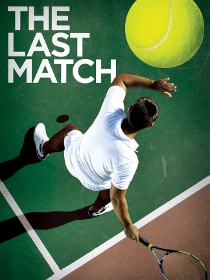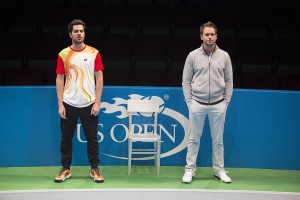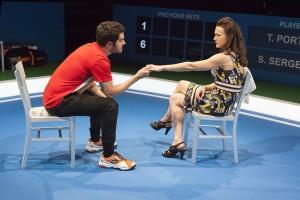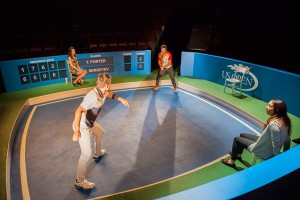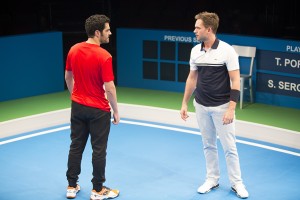WHOOSH!
“All the world’s a stage,” Shakespeare memorably said. “And all the men and women merely players.” In a world premiere at the Old Globe, Anna Ziegler’s new play The Last Match successfully plays off the Bard’s famous monologue, equating tennis with life, athletic striving with human struggle, and delivering a deft, luminous play.
Dueling it out at the US Open is Sergei (Alex Mickiewicz), the young Russian upstart longing to crack the top 10, and Tim (Patrick Adams), the long-reigning top-ranked American champion. In this one-act Ziegler has characters stepping out of current time to relive key events from their unfolding pasts as orphaned children, cocky junior players, reckless lovers, marriage partners and grief-stricken young parents, always with a keen eye on inescapable death.
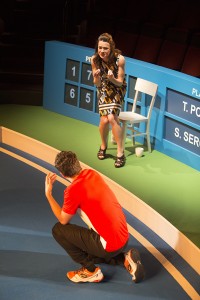 “Whoosh!” is how the players at the outset of the drama attempt to describe the indescribable feeling of being “in the zone” and “hitting the sweet spot.” It stands as a metaphor for those profound moments of ecstasy to be found in life – moments these characters live for. The Last Match swells with intensity and poetic undertones as it courses through 90 minutes with increasing velocity, asking big questions about the human condition. Love and loss, past and present are always in tension as Tim and his wife, Mallory (the moving Troian Bellisario), in conjunction with Sergei and his strong-willed fiancée, Galina (played with moxie by Natalia Payne), relive joys and losses.
“Whoosh!” is how the players at the outset of the drama attempt to describe the indescribable feeling of being “in the zone” and “hitting the sweet spot.” It stands as a metaphor for those profound moments of ecstasy to be found in life – moments these characters live for. The Last Match swells with intensity and poetic undertones as it courses through 90 minutes with increasing velocity, asking big questions about the human condition. Love and loss, past and present are always in tension as Tim and his wife, Mallory (the moving Troian Bellisario), in conjunction with Sergei and his strong-willed fiancée, Galina (played with moxie by Natalia Payne), relive joys and losses.
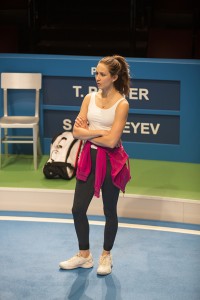 The entire cast is excellent, but Ms. Bellisario performs the role of Mallory with a particularly lovely vulnerability and delicate intensity. While Adams at the outset comes across as somewhat sluggish and a bit glum, out of step with our expectations of a grand champion, we later learn the reasons for this, which serve to complicate a man who emerges as admirable and highly likeable. Mickiewicz, on other the hand, explodes on the stage with convincing pent-up nervousness, easily conveying Sergei’s wild, tiger-like spirit. The more we learn about each player’s backstory (and that of their female partner), the greater becomes our awareness of human frailty. Mallory’s heartbreaking struggle to have children, and Galina’s emotionally deprived girlhood in Russia, fuel each woman’s determination to live despite pain and disapointments, while raising the stakes for their male partners.
The entire cast is excellent, but Ms. Bellisario performs the role of Mallory with a particularly lovely vulnerability and delicate intensity. While Adams at the outset comes across as somewhat sluggish and a bit glum, out of step with our expectations of a grand champion, we later learn the reasons for this, which serve to complicate a man who emerges as admirable and highly likeable. Mickiewicz, on other the hand, explodes on the stage with convincing pent-up nervousness, easily conveying Sergei’s wild, tiger-like spirit. The more we learn about each player’s backstory (and that of their female partner), the greater becomes our awareness of human frailty. Mallory’s heartbreaking struggle to have children, and Galina’s emotionally deprived girlhood in Russia, fuel each woman’s determination to live despite pain and disapointments, while raising the stakes for their male partners.
We watch the crucial semifinal match play out from all sides as the characters ask existential questions, often in direct address (the in–the-round stage perfectly suggests a stadium). Zeroing in on who will win at Center Court, economically brought to life on an artificially illuminated simple blue square (Tim Mackabee, set and Bradley King, lights), we are simultaneously drawn toward the accelerating questioning of the meaning of human existence. Ziegler’s lyrically philosophical script lobs tough questions: Can you escape your own death? Can you hold on to the belief that you deserve to win? How can you ever get to the bottom of wanting?
A certain melancholy drives these shots, but the robust physicality of the actors and their ardent delivery offsets any ponderousness (under Gaye Taylor Upchurch’s urgent direction, the play never sags). It turns out that the dynamic clash of opposites, mirrored in the play’s thematic polarities of youth versus age and life versus death — so superbly reenacted by “the game” — reveals itself to be the catalyst of élan vital, or vital force, which drives these players toward a kind of victory. It is the velocity of such passion that propels us toward all accomplishment, Ziegler suggests: the testing of physical limits, the incarnation of children, and to the game of life itself. “Whoosh” indeed.
photos by Jim Cox
The Last Match
The Old Globe’s Sheryl and Harvey White Theatre
1363 Old Globe Way in Balboa Park
Tues and Wed at 7; Thurs and Fri at 8;
Sat at 2 & 8; Sun at 2 & 7
ends on March 13, 2016
for tickets, call 619.437.6000 or visit The Old Globe
